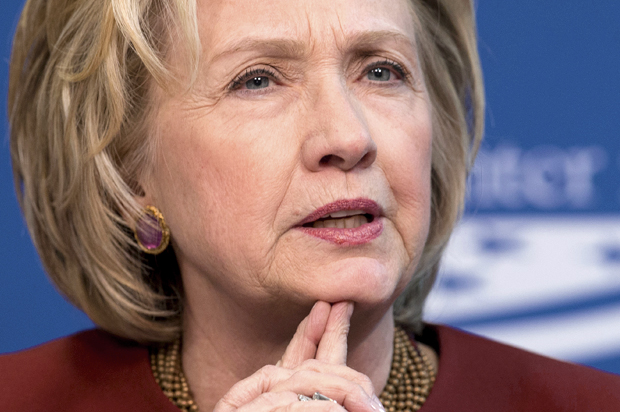The New York Times published a much-discussed article this weekend declaring that Hillary Clinton has already made the Big Choice about how she’ll run her second presidential campaign: by focusing on energizing core Democratic voters instead of appealing directly to “the center.” It featured anonymous quotes from Clinton campaign officials explaining that running a 50-percent-plus-one strategy is the only effective way to win an election in this era of polarization and relatively few “true” swing voters, much unlike the atmosphere when her husband ran the first time in 1992. (So many Hillary Clinton articles try to foment some sort of conflict between her and Bill, as though Bill isn’t one of the strategists looking at the political climate and urging her to adopt this precise strategy because it’s the best way of winning.)
The Times piece is written with an undercurrent of tragedy: that, alas, it’s a shame that things are so polarized and Hillary Clinton sees no need to visit the South and pander to Bubba voters, like Democrats did in the good ol’ days. A shame that she has resigned herself to appealing only to core Obama-coalition constituencies like minority voters, young people and single women.
But what are the policies that led the Times to assume that Hillary has already answered these questions about the sort of campaign she’ll run? What godlessly leftist positions has she staked out and, by staking out, scared away all the white people?
So she is embracing the central lesson of the Obama school: that voters turn out when they believe that an election makes a difference and that their party’s standard-bearer is a champion on issues important to them.
By emphatically staking out liberal positions on gay rights, immigration, criminal justice, voting rights and pay equity for women, Mrs. Clinton is showing core Democratic constituencies that she intends to give them a reason to support her.
Clinton has indeed “emphatically” staked out positions on these issues and shown off her policy fluency — her strongest asset — in speeches and round tables discussing them. But it’s hard to spin her postures on these issues as targeted only toward a “narrow” group of leftists who’ve hijacked the Democratic Party. Aside from perhaps the extent to which she’s willing to go on immigration, her positions on these issues have near-uniform support from most factions of the Democratic Party — and enjoy majority support from the American people as well. That she supports same-sex marriage, immigration reform with a path to citizenship, criminal justice and sentencing reform, protecting voting rights and pay equity for women tells us little about whether she’s sidling up to the activist liberal or corporate centrist wing of the Democratic Party. These are now just standard Democratic Party positions, like being pro-choice.
Which is to say: Clinton has only answered the easy questions so far. (By “easy” I don’t mean unimportant.) Until she clarifies herself on broader economic and foreign policy issues, it’s hard to say that she’s fully locked arms with the dirty hippies.
On broad economic policy, the mainstream Democratic Party, at least in the 2014 cycle, had … nothing. Like many others, I wrote after last year’s wipeout about how the Democratic Party needed to determine exactly what sort of economic policies it wanted to rally around. No, not what “economic message” it wanted. It certainly has the message down: It finds increasing economic inequality and the carving out of the middle class to be dangerous. When it comes time to fill in those blanks, though, the party can’t get further than advocating for an increase in the minimum wage and investment in infrastructure — both good things, but more adaptations to an unfair economic system than structural changes to it.
Bernie Sanders has come in to fill in those blanks, and in ways that will expose divisions between factions in the Democratic Party. He is advocating for bold, direct changes to the tax code to transfer wealth from the top to the bottom, even if that sacrifices a certain #innovative #dynamism in the deodorant industry. Does Clinton support a similarly aggressive approach to equalize outcomes — transferring money from super-rich people downward — or will she stick to more centrist, “opportunity”-based solutions like spending more on education or job training or whatever? We don’t know. The nearest she’s come to speaking on a thorny economic issue that’s split Democratic constituencies is on TPP, and there she hasn’t spoken at all: She’s just bought more time.
On foreign policy, Clinton has said next to nothing. This is probably because she’s more hawkish than the left wing of the Democratic Party is, and she doesn’t want to “get into it” yet. Does she support the framework of the nuclear deal that the Obama administration is trying to wrap up right now? Maybe … maybe not! Does she still want to throw tons of guns into Syria? Ukraine? And to what ends? Does she believe that a resolution authorizing the fight against ISIS should strictly forbid the mass deployment of ground troops? Does she believe the United States should no longer use its veto power to block U.N. recognition of a Palestinian state, because Netanyahu is terrible? (Does she think that Netanyahu is terrible?)
Hillary Clinton so far has not weighed in on the trickiest questions that might expose factional disagreements within the Democratic Party. Hey, no problem. Her campaign says it’s going to release more fleshed out views on domestic and foreign policy after her first rally on June 13. Until then, though, it doesn’t make sense to conclude that she’s thrown in her lot with the demonic fire-breathing leftists because she supports same-sex marriage and protecting voting rights.

